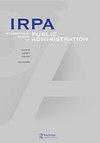使用Q方法识别求职者对韩国公职人员的看法
International Review of Public Administration
Pub Date : 2022-07-03
DOI:10.1080/12294659.2022.2102408
引用次数: 0
摘要
长期以来,公共服务职位一直是韩国年轻人最渴望的工作之一。个人参加国家公务员考试的动机可能是复杂的,这不能用单一的理论或框架来解释。例如,公共选择或公共服务动机理论可能并不能单独描述韩国年轻人为政府工作的愿望。此外,可能有必要具体考虑韩国文化,以检查一个人成为公职人员的动机的复杂性。本研究旨在对年轻人对官僚的认知进行分类,找出国家公务员考试热潮背后的原因,从而提出理论和实践意义。使用Q方法,本研究确定了对韩国公职人员的四种不同看法:真正的公共服务人员,地位上升的追求者,自我利益最大化者和公共政策制定者。这些概念有助于理解韩国年轻人选择政府作为雇主的混合动机,并有助于制定更好的政策来解决年轻人为准备国家公务员考试而退出劳动力市场的问题。本文章由计算机程序翻译,如有差异,请以英文原文为准。
Identifying job seekers’ perceptions of public officials in Korea using Q methodology
ABSTRACT Public service positions have long been one of the most sought-after jobs among the youth in the Republic of Korea. Individuals may possess mixed motives to take the national civil service exam, which cannot be explained by a single theory or framework. Public choice or public service motivation theory, for example, may not alone describe young Koreans’ desire to work for the government. Furthermore, it may be necessary to specifically consider the Korean culture to examine the complex nature of one’s motivation to become a public official. The study aims to categorize how the youth perceive bureaucrats and find reasons behind the craze for taking the national civil service exam, thus suggesting theoretical and practical implication. Using Q methodology, this study identified four distinct perceptions of Korean public officials: genuine public servers, rise-in-status pursuers, self-interest maximizers, and public policymakers. These conceptions contribute to understanding how young Koreans feature mixed motivations to choose the government as their employer and designing better policies to tackle the issue of youth removing themselves from the labor market to prepare for the national civil service exam.
求助全文
通过发布文献求助,成功后即可免费获取论文全文。
去求助
来源期刊

International Review of Public Administration
Social Sciences-Public Administration
CiteScore
2.00
自引率
0.00%
发文量
21
期刊介绍:
The International Review of Public Administration (ISSN 1229-4659) is published biannually by the Korean Association for Public Administration (KAPA) to provide a worldwide audience with the opportunity for communication and further understanding on issues of public administration and policy. There will be a triple-blind peer review process for all submissions of articles of general interest. There are no particular limitations on subject areas as long as they are related to the field of public administration and policy or deal with public employees. Articles should be analytic and demonstrate the highest standards of excellence in conceptualization, craftsmanship, and methodology.
 求助内容:
求助内容: 应助结果提醒方式:
应助结果提醒方式:


